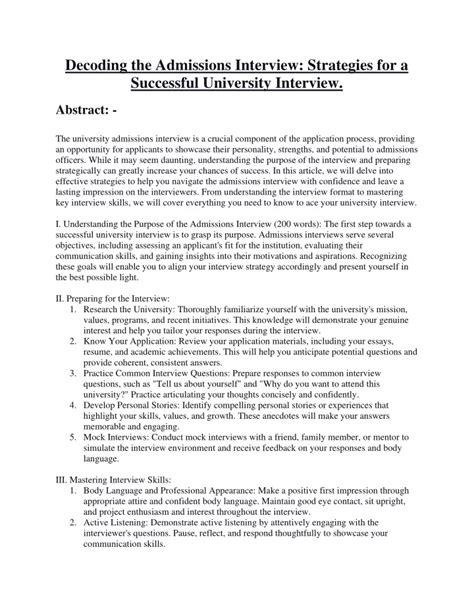Introduction

The medical school interview is a crucial step in the admissions process, providing an opportunity for both applicants and admissions committees to assess fit and suitability. Its significance in determining an applicant’s chances of acceptance is often debated, with varying estimates of its weighting in the overall evaluation.
Weight of the Interview in Admissions Decisions
According to the American Association of Medical Colleges (AAMC), the interview is one of four primary factors considered in admissions decisions, along with academic performance, extracurricular activities, and personal statements.
| Factor | Weight |
|---|---|
| Academic Performance (GPA/MCAT) | 40-50% |
| Extracurricular Activities | 10-15% |
| Personal Statement | 10-15% |
| Interview | 20-25% |
Components of the Interview and Their Significance
The interview typically consists of several components, each of which is evaluated by the admissions committee:
- Communication Skills: The ability to articulate thoughts clearly, engage in meaningful conversation, and demonstrate empathy.
- Interpersonal Skills: Interpersonal communication, teamwork, and conflict resolution abilities.
- Professionalism: Conduct, dress, and adherence to ethical and legal standards.
- Motivation and Values: Passion for medicine, alignment with the school’s mission, and understanding of the profession’s demands.
Impact of the Interview on Applicant Ranking
The interview can significantly impact an applicant’s ranking in the admissions pool. A strong interview can enhance an applicant’s chances of acceptance, even if their academic record or other factors are slightly below the school’s average. Conversely, a weak interview can diminish an applicant’s ranking, regardless of their high GPA or extensive extracurricular activities.
Before the Interview:
- Research the school and prepare specific questions about its curriculum, research opportunities, and student life.
- Practice your answers to common interview questions and prepare questions to ask the interviewer.
- Dress professionally and arrive on time for the interview.
During the Interview:
- Listen attentively to the interviewer and respond thoughtfully and concisely.
- Be yourself and demonstrate your genuine interest in the school and profession.
- Ask informed questions to show your engagement and curiosity.
- Thank the interviewer at the end and reiterate your interest in the school.
After the Interview:
- Follow up with a thank-you note within 24 hours of the interview.
- Reflect on your performance and identify areas for improvement in future interviews.
The medical school interview is a substantial component of the admissions process, accounting for approximately 20-25% of the overall evaluation. Applicants who perform well in the interview have a greater chance of acceptance, even with a slightly weaker academic record. Preparation and authenticity are key to a successful interview outcome.
